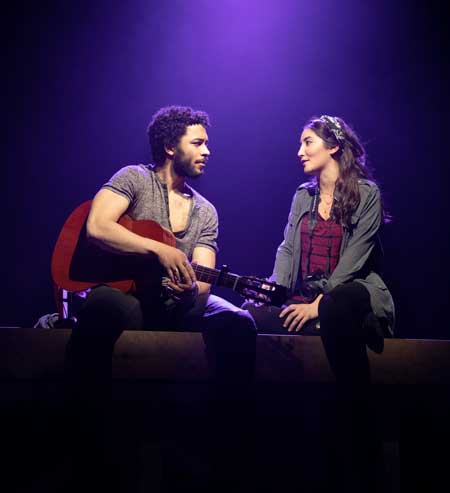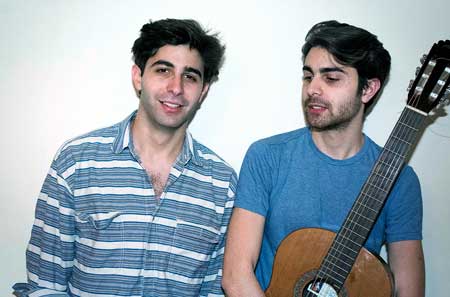Musical (2016)
Book, Music and Lyrics by Daniel Lazour and Patrick Lazour
Directed by Taibi Magar
American Repertory Theatre
Loeb Drama Center
Harvard University, Cambridge, MA
May 14 – June 23, 2019
Choreography: Samar Haddad King; Music Supervision: Michael Starobin; Vocal Arrangements: Daniel Lazour and Madeline Smith; Orchestrations: Daniel Lazour and Michael Starobin; Scenic and Costume Design: Tilly Grimes: Lighting Design: Bradley King; Sound Design: Kai Harada; Projection and Video Design: David Bengali
With Sharif Afifi (Karim), Abubakr Ali (Hany), Jakeim Hart (Amir), Dana Saleh Omar (Fadwa), Gil Perez-Abraham (Hassan), Parisa Shahmir (Layla), Waseem Alzer (Ensemble), Layan Elwazani (Ensemble)

Parisa Shahmir as Layla
in “We Live in Cairo”
Photo: Evgenia Eliseeva
Courtesy of American Repertory Theatre
It came almost out of nowhere, which made it so exciting and riveting. One remembers the headlines from those several years ago, in late 2010 and continuing into 2011, when student demonstrations led to far more broad-based protests in Cairo that eventually led to the resignation of thirty-year autocratic leader Hosni Mubarak. The exuberance of the initial overthrow was soon met by more sober reflections on who would take over. When the Muslim Brotherhood gained a majority in the subsequent general election and Mohammed Morsi took over, grim reality set in once again. That turn of events was, relatively soon afterwards, followed by a military coup.
This musical and video extravaganza tracing, then celebrating the victory of, the protests, particularly as presented in the first half of this quite remarkable theatrical outing, is stunningly good. It is energetic, passionate, beautifully composed, played and sung, and choreographed and staged with an enormous sense of vitality, energy and inventiveness. The energy is infectious, and gives a true sense of what the exuberance of the protesters in Cairo at the time must have been like.
One almost cannot say enough good things about the stageworthiness of that first half.

Photo: © 2018 Lazour
Lazour Brothers
The musical composition by brothers Daniel Lazour and Patrick Lazour, along with Madeline Smith and Michael Starobin, is a striking combination of Middle Eastern music and folk in some kind of musical theatre medium that makes it all present exceedingly well, and the instrumentalists are superb, with noteworthy riffing on guitar.
The voices – particularly of the two leading women, Dana Saleh Omar (Fadwa) and Parisa Shahmir (Layla), and of the guitar-strumming Jakeim Hart (Amir) – are wonderfully clear and resonant. Hart is also an excellent guitarist whose picking style is fluid and evocative, noteworthy in such numbers as Son of Tahrir.
Lyrics to songs, also by the amazing Lazour brothers, are based largely in rambling vernacular, but somehow, with this revolution-based subject-matter, it all seems appropriate and works very well. There are also catchy numbers with bouncier lyrics like Let’s take a break in Sharm El Sheikh to fill things out. A simple recurring theme which the cast teaches to the audience at the beginning of the show is quaintly engaging and forms an effective initial bond.
The choreography by Samar Haddad King is exceptionally good throughout, keeping the stage constantly and interestingly alive.
As the revolutionary firebrand Fadwa, Dana Saleh Omar does a wonderful job of conveying the passionate faith of the dissident and of constantly energizing her group of compadres. Parisa Shamir’s Muslim Layla falls in as political photographer, and joins up romantically with the Christian songwriter Amir, with implications of the completely forbidden.
Projections, done with exquisite comprehensiveness by David Bengali, array the back of the stage and sometimes extend to the ceiling of the theater, giving a visual crib sheet for all of the blow-by-blow goings on of the several weeks of protests and their aftermath.
The exuberance and sheer hopeful energy of the first part of the show devolve, in the second part, to a disintegration of the initial optimism. In service of delivering a sense of the consequences of that change, the script becomes somewhat more amorphous. Taking on embedded tensions between Muslims and Christians and their associated political affiliations, the narrative at this point is more suggestive than illuminating. That, indeed, is a function of trying to fit it into the second half of a musical rather than into the bulk of a three act play which the subject could easily deserve. The result is a bit of narrative wandering that gives a few slices of that fragmentary sense without as much follow through as it might have.
Frankly, however, the challenge of writing a musical that begins with great optimism and ends with grave disappointment is enormous; the young authors, a pair of brothers in their twenties, have done a remarkable job of rising to that challenge, though the results, in that downturn of the second half, might deserve just a bit of tightening up to make that second half as potent as the first. Even so, in the context of that complex and disheartening downturn, the concluding number We Remain In Light is beautifully and movingly done.
Political theater can often be annoying preachy; this show manages to not do that at all. Consequently, it represents a notable accomplishment in the field, and particularly of musical political theater. It manages to educate, inspire and entertain in one fell swoop, and to provide a significant dose of political realism to complement its exuberance. All of that in one package is not easy; these two young authors, and this wonderful production supervised by director Taibi Magar under the auspices of the ART, are to be strongly commended for putting such a complex order together so compelling well.
– BADMan
Leave a Reply